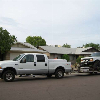ahuggins6
Well-Known Member
- Joined
- May 20, 2011
- Messages
- 194
- Reaction score
- 88
- City, State
- New Boston, TX
- Year, Model & Trim Level
- 1999 explorer 4.0 auto
I was given a 99 4dr SOHC by a neighbor lady whose husband had some down with demensia. Soon after driving it a few years, I pulled the motor and put a timing set in it (my second vehicle to do this to, having sworn the first time that I wouldn't do it again.) I got this one all back together and soon after getting it back on the road, smelled oil burning. I've always suspected it to be leaking at the back of the jack shaft since I made no attempt to seal that plug beside knocking it in square to the hole and flush to the block. However, it seems like it may be leaking everywhere--valve covers, oil pan and so on. IDK. I've been mechanicing since I was about 10yo--a LONG time ago. You'd think that when I put new gaskets all over an engine, they wouldn't leak???? Also, the chain rattle never really went away. Yes, i used a cheaper set, so I'm thinking I should put a new pair of tensioners in it??
Anyway, fast forward to today. Was driving down the road when I heard a rattle I couldn't relate to the chains. I decided to pull over and look, but before I came to a stop, the engine just died. Turned out the top radiator hose had blown off the radiator, and even further, the plastic end on the radiator had blown open. Temp gauge still reads normal hours later with the key off! I had my dad bring my truck and trailer to get me, and it fired up and drove on the trailer. So I know it still runs, right?
To get to the issue: I have two other V8 explorers here waiting to power early bronco projects. I don't think it would be hard to V8 swap it, but I'm not sure just how many parts have to be changed outside the engine and mounts, trans, harness, drive shaft(??), and radiator. Does the exhaust manifolds come to the same points on both engines?
Or should I just pull the V6, fix the leaks and get a new radiator for that--assuming the engine didn't freeze in the -4 degree temps last week. A year and a half ago, I had overheating issues and found the radiator stopped up, so it got another radiator out of the junkyard which I have not until today had a problem with.
What do you guys think? I'm not driving it a lot these days due to COVID and working from home, but my other vehicles are a super duty with 6.0 that needs injectors rebuilt and possibly new heads any day and my early bronco which I have basically rebuilt from the ground up and is technically more dependable than the other two. When I am driving it, it's typically my ride to work three hours from home on Tuesday and back home on Thursday, so lots of miles and far from home. Fuel mileage will be somewhat of a concern.
Anyway, fast forward to today. Was driving down the road when I heard a rattle I couldn't relate to the chains. I decided to pull over and look, but before I came to a stop, the engine just died. Turned out the top radiator hose had blown off the radiator, and even further, the plastic end on the radiator had blown open. Temp gauge still reads normal hours later with the key off! I had my dad bring my truck and trailer to get me, and it fired up and drove on the trailer. So I know it still runs, right?
To get to the issue: I have two other V8 explorers here waiting to power early bronco projects. I don't think it would be hard to V8 swap it, but I'm not sure just how many parts have to be changed outside the engine and mounts, trans, harness, drive shaft(??), and radiator. Does the exhaust manifolds come to the same points on both engines?
Or should I just pull the V6, fix the leaks and get a new radiator for that--assuming the engine didn't freeze in the -4 degree temps last week. A year and a half ago, I had overheating issues and found the radiator stopped up, so it got another radiator out of the junkyard which I have not until today had a problem with.
What do you guys think? I'm not driving it a lot these days due to COVID and working from home, but my other vehicles are a super duty with 6.0 that needs injectors rebuilt and possibly new heads any day and my early bronco which I have basically rebuilt from the ground up and is technically more dependable than the other two. When I am driving it, it's typically my ride to work three hours from home on Tuesday and back home on Thursday, so lots of miles and far from home. Fuel mileage will be somewhat of a concern.











